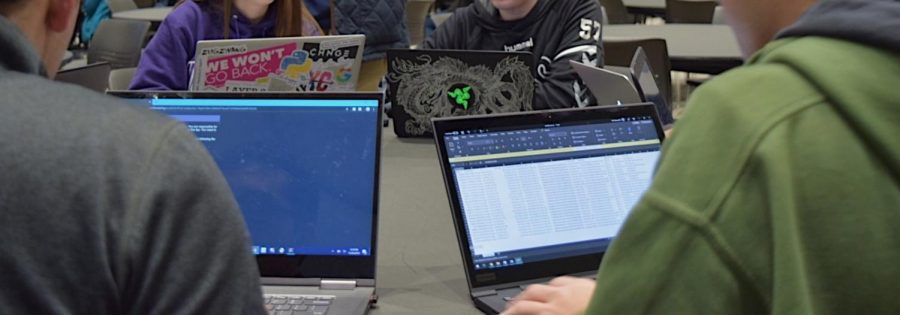Learning by Doing: The Cyber Fire Competition is for Learning about Cybersecurity
December 17, 2019
Students from colleges and high schools nearby gathered into the room, most of them with heavy bags on their backs. They sat down at the circle tables and began to pull their computers, chargers and computer mice out of their bags. About 60 people filled the tables making groups with four to six people per group. The groups then entered the competition through the website provided and made up group names. Trying, Do The Dew, and CyberFire Fighters were a few of the names.
The stage for the battle was the very first Cyber Fire Puzzle event ever hosted at the College of DuPage. The program is funded by the U.S. Department of Energy, and they have various events around the country. The events are led by expert security investigators from the United States Department of Energy National Laboratories. Cyber Fire has a philosophy of learning by doing.
As the competition began, the groups began to chatter and worked through different puzzles. One of the first types of puzzles they encountered was a sequence. With little to no instructions provided, the groups needed to figure out what numbers or letters followed. The sequence could be a series of different symbols or coding that needed to be put into a document to see properly. The first sequence was a series of numbers: 1 2 3 4 5 _. As the groups went through the sequences they got harder, one consisted of what looked like nothing. Someone had the idea of copying and pasting the text box that appeared empty into Microsoft Word to see if anything would show. Still nothing. Then, they clicked on the paragraph symbol that allowed paragraph marks and other formatting to be shown. Boxes and dots of varying heights finally appeared on the screen.
Some of the other types of puzzles the participants encountered were on coding, protocols, encryptions and decryptions, several different types of ciphers and WOPR (War Operation Plan Response). WOPR puzzles consist of the participants finding different codes to try to launch or destroy the server. The puzzle provided by CyberFire is just a game and allows practice without any actual consequences.
Dan Harkness and Alec Poczatek, the hosts and mentors of the event, walked around the room providing the groups with feedback and suggestions. They provided different angles and ways to go about solving the puzzles. Harkness and Poczatek wouldn’t provide any solutions because they wanted the participants to struggle through the problem and find a solution on their own.
Professor Tony Chen, the event coordinator, said, “It is a training event for cyber competition. We do not emphasize the competition aspect of the cyber puzzlings; it is emphasizing on the training and learning opportunities.”
Chen said the only thing needed to partake in future events is an interest in cybersecurity and an open mind to learning about the field. Every participant in the competition should walk away knowing more than they previously did.
“We help anyone; you don’t need to know anything about it. All we need is someone with a mind of learning to come, and we will teach, and we will show you.”
Each member of the group was hunched over their computers, typing at their keyboards. They looked information up and continued to talk to the other members of their group. As time went on, more and more puzzles were posted and offered more points as the level of intricacy increased.
As the clock began to reach the ending time of the competition, each group attempted the puzzle labeled “indy.” However, no one could solve the puzzle before the time was up. It consisted of translating text into English and figuring out what the coordinates provided meant.
Once the time was up, all the heads turned to the scoreboard. The group with the name of “bigdogs” won the competition. They won bragging rights. The winners didn’t receive a prize because both, Cyber Fire and Chen, want the focus of the event to be learning. Many of the groups were participating for extra credit points for several different teachers in the technology department at COD.
Chen hoped that everyone, win or lose, had a fun time at the competition but more importantly, that they learned something new.


















